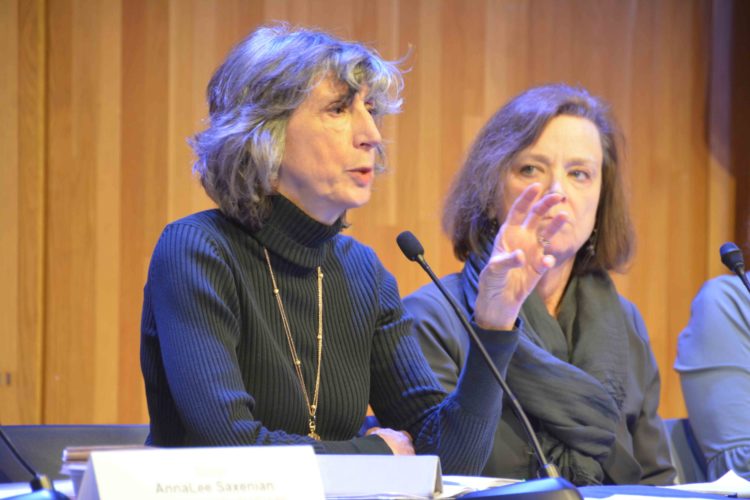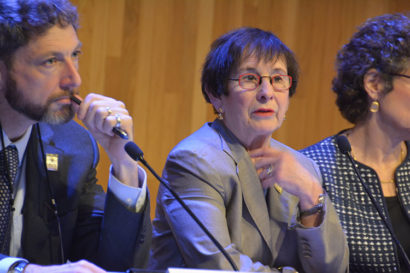Town halls offer a chance to hear about — and weigh in on — the future of Berkeley
Members of the strategic planning process's four work groups discussed their charges, outlined their progress and took feedback from the campus this week at two town halls

February 15, 2018
As the facilitators of UC Berkeley’s recently announced strategic planning process, Academic Senate Division Chair Lisa Alvarez-Cohen and Haas School of Business Dean Rich Lyons have a daunting assignment: to reimagine what a stronger Berkeley might look like in 10 years, and to chart a path that will get us there.
It is a monumental task, yet the end result of their work will have to be … quite small.
“Ultimately, the chancellor has asked for a very high-level framework document, just two pages of paper,” said Alvarez-Cohen at one of two town halls the campus held this week to discuss the initiative. “We’re hoping she’ll let us use both front and back.”
Berkeley’s last strategic plan was completed in 2002, and both the institution and the higher education environment in which it operates have changed a great deal since then, Alvarez-Cohen said. The campus is taking on this project so that it can better confront current challenges as well as identify and capitalize on emerging opportunities.
According to Lyons, the plan will also help define the themes that frame Berkeley’s forthcoming fundraising campaign, which will launch within the next few years. It will also inform the next iteration of Berkeley’s long-range development plan, which guides land use and construction on the campus.
In their introductions to this week’s town halls, Alvarez-Cohen and Lyons described in detail the structure and timeline of the planning process. Throughout the spring, four working groups of faculty, staff, students and administrators will each investigate a topic area: One will determine which “grand challenges” in the world Berkeley’s teaching and research should focus on addressing; the second will look at improving the student experience on campus; the third will consider optimal enrollment levels; and the fourth will aim to strengthen the campus’s financial strategy.
Those groups’ conclusions will be reconciled by a larger strategic planning steering committee, which will produce the final two-page framework and present it to the chancellor and community. Alvarez-Cohen hopes the project will be completed by the end of the semester.

Fiona Doyle, co-chair of the student experience working group, spoke under blue lights at one of this week’s town halls.
Barbara Spackman, vice chair of the Academic Senate and co-chair of the “grand challenges” working group, said her group has been hard at work identifying “the critical issues facing our state, nation and world that Berkeley is uniquely situated to address.” Members are studying past reports from the Office of the Vice Chancellor for Research and other campus units, evaluating peer universities’ academic foci and gathering input from students and faculty.
“What have we come up with? So far, lots and lots of ideas,” said Henry Brady, dean of the Goldman School of Public Policy and the working group’s other co-chair. He listed a dozen of the real-world issues identified thus far that Berkeley might throw more of its academic weight behind: Environmental science and environmental sustainability; basic needs, inequality and equal opportunity; big data, artificial intelligence, machine learning and robotics; reinvigorating free speech, reforming democracy; and the impact of new technology on work, higher education and culture.
Spackman and Brady’s group is also looking into how the campus’s academic structures might change so that Berkeley is best able to address such topics.
“We’re thinking about options for differential growth, about increasing interdisciplinarity and about the role and evolution of Berkeley’s comprehensive excellence in the next 10 years,” Spackman said.
The co-chairs of the working group tasked with improving the Berkeley student experience also discussed potential changes to the academic enterprise – but with an eye towards better preparing learners for life and work in a rapidly changing world.
“We are thinking about what sort of curriculum is going to prepare graduates who will retire in over 40 years,” said Fiona Doyle, vice provost for graduate studies and dean of the graduate division, as well as one of the group’s co-chairs. “What ways of thinking should we be instructing them in so they can be effective in their working lives? When I think about how much the world has changed in the past 40 years, it’s a significant question to ask.”
Her group must also confront more fundamental concerns, however.
“We hear over and over again that housing is such a major issue before us, as are other basic needs,” said Genaro Padilla, a professor of English and the working group’s other co-chair. “There must be greater advising and mentoring opportunities. We need to reduce the ratio of faculty to students. These are things we need to address.”

Ben Hermalin, co-chair of the financial strategy working group, and Cathy Koshland, a member of the enrollment group.
In describing the work of the enrollment working group, its representatives at the town halls talked about how Berkeley can educate more students while limiting impact on a physical campus that is already at maximum capacity.
“Some of the things we’ve thought about have been how to better leverage study abroad during the academic year, programs like the Fall Program for Freshmen, opportunities to work with other institutions like Mills College, and of course digital and online courses,” said Cathy Koshland, vice chancellor for undergraduate education and a member of the enrollment group.
To better serve societal and state needs, Berkeley may also need to reconsider the types of students it serves and perhaps develop a more expansive definition of the term “enrollment,” added College of Environmental Design dean and working group co-chair Jennifer Wolch.
“The university’s focus has been on undergraduate and graduate students but, increasingly, people over the course of their lives want to reeducate themselves or go back to an education they had begun…so we have to think more about nontraditional students,” Wolch said.
The last working group, charged with strengthening Berkeley’s financial strategy, will look at how the campus should change in order to finance its lofty goals.
“As we look at the next 10 years, all of the scenarios we imagine are scenarios in which our expenses keep growing,” said working group co-chair Jenna Johnson-Hanks, who is also chair of the Academic Senate Committee on Academic Planning and Resource Allocation and a professor of demography.
Financial strength won’t be accomplished through cuts, though, but through generating new revenue, according to co-chair and Vice Provost for the Faculty Ben Hermalin.
“No one’s ever cut their way to excellence — except maybe a surgeon,” said Hermalin. “This is not just about scraping by each year, it’s about how we thrive, and that’s going to require getting ahead of the escalating cost curve that we face. Philanthropy is going to be very important. So are self-supporting degree programs. We can do a better job of leveraging the intellectual property that is developed here. We can also leverage our real estate — housing and other sources.”
At the first town hall, after representatives from the working groups discussed their endeavors and took several dozen questions from an audience of mostly faculty and staff, Dean Lyons offered some closing thoughts.
“With anything like this, it is important for us to ask: What does success look like?,” said Lyons. “Here’s how I’m thinking about it: Can we come up with a framework document in six months that has 10 really good ideas? We won’t cover everything, but I think that if we can come up with 10 truly good ideas that serve the campus, we’ll have accomplished our goal.”
To stay abreast of their progress, visit http://strategicplan.berkeley.edu/